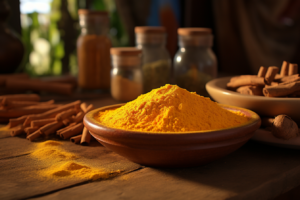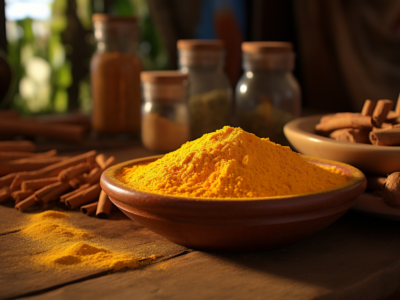Introduction to Curcumin
Curcumin is a compound found in turmeric, a spice commonly used in Indian cuisine. It has been used for centuries in traditional medicine to treat a variety of ailments, and is now gaining popularity as a dietary supplement. Curcumin is thought to have anti-inflammatory and antioxidant properties, and may be beneficial for conditions such as arthritis, diabetes, and inflammatory bowel disease. It is important to note that taking turmeric or a curcumin supplement may have effects and side effects, and it is important to be aware of potential drug interactions.
When taking turmeric or a curcumin supplement, it is important to be aware of the amounts of turmeric or curcumin you are taking. Taking too much turmeric or curcumin may increase the risk of adverse side effects, such as nausea, diarrhea, and bleeding. It is also important to be aware of possible interactions with medications, such as blood thinners and diabetes medications. Taking a curcumin supplement may also slow blood clotting, so it is important to stop taking it at least two weeks before a scheduled surgery. In general, turmeric is likely safe for most people, but it is important to be aware of the possible side effects and drug interactions before taking it.
Benefits of Curcumin
Curcumin is a compound found in turmeric, a spice commonly used in Indian cuisine. It has been used for centuries in traditional medicine to treat a variety of ailments. Recent research has revealed that curcumin has a number of health benefits, including anti-inflammatory and antioxidant properties. Taking curcumin supplements may help reduce inflammation, improve blood sugar levels, and even reduce the risk of certain types of cancer.

Studies have also shown that curcumin may play a role in reducing the symptoms of rheumatoid arthritis, ulcerative colitis, and irritable bowel syndrome. It may also help improve endothelial function and lower blood sugar levels. Curcumin supplements are generally considered safe for most people, although taking too much may cause mild side effects such as nausea and stomach upset.
It is important to talk to your doctor before taking curcumin supplements, especially if you are taking warfarin or other medications that may interact with curcumin.
Side Effects of Curcumin
Curcumin is a compound found in turmeric, a spice commonly used in Indian cuisine. It has been studied for its potential health benefits, but it may also cause some side effects. Turmeric may contain up to 3% curcuminoids, and curcumin supplementation can range from 500 mg to 12,000 mg per day. While the safety of turmeric and curcumin is generally considered to be good, it is important to be aware of the potential side effects.
Studies show that curcumin can interfere with the effects of medications used to treat type 2 diabetes, sulfasalazine, and certain medications used to treat cancer. It can also cause serious side effects in people with bile duct obstruction, as it can act like the hormone estrogen and increase the risk of bleeding. Curcumin or turmeric supplements containing large amounts of curcumin may also interfere with iron absorption and cause nausea in a small number of people. Additionally, turmeric use may increase the risk of gastroesophageal reflux disease in pregnant women, and it may lower testosterone levels and decrease the effectiveness of conjugated equine estrogens. Therefore, if you are concerned about the possible side effects of turmeric or curcumin, it is best to consult your doctor before taking any commercial turmeric or turmeric supplement.
Interactions of Curcumin
Turmeric, a root that is ground into a powder, is a popular ingredient in many Indian dishes. It is also known for its anti-inflammatory effects, and its active ingredient, called curcumin, is being studied for its potential role in human health. Studies show that curcumin has a variety of interactions with the human body, and it is important to understand the effects of taking oral curcumin.
Turmeric contains curcumin, which is a compound that has been studied for its effects on estrogen. It has been suggested that curcumin may help reduce the adverse effects of exposure to hormones, such as bleeding and bruising. However, quickly the liver breaks down curcumin, so it is recommended to take between 500-2000 mg of curcumin per day for optimal effects. Studies published in Food Chem Toxicol and Int J Cancer suggest that curcumin supplementation may help reduce symptoms in people who are pregnant at risk. Therefore, it is important to understand the role of curcumin and turmeric supplementation in order to reap the benefits of this powerful ingredient.
Dosage of Curcumin
Well, when it comes to dosage of curcumin, it’s important to know that turmeric contains a compound called curcumin. This compound is what gives turmeric its yellow color and is known to have many health benefits. Generally, the recommended dosage of oral curcumin is 500-2,000 mg per day. However, if you’re pregnant, it’s best to avoid taking curcumin as it can have adverse effects on estrogen levels and put your pregnancy at risk.

If you’re looking for a more natural way to get your daily dose of curcumin, you can try using turmeric powder or turmeric root. Both of these are great sources of curcumin and can be added to your meals or drinks. Just make sure to start with a small amount and gradually increase it as needed. With the right dosage of curcumin, you can reap the many benefits this compound has to offer.
Effects of Turmeric
Turmeric is a spice that has been used for centuries in traditional medicine. It has a variety of effects on the human body, including those related to estrogen. Curcumin, a compound found in turmeric, has been found to have a positive effect on estrogen levels in the body. Studies have shown that taking a daily dose of curcumin can help reduce the effects of estrogen on the body.
Pregnant women should be especially careful when taking turmeric, as it can increase the risk of pregnancy complications. However, when taken in moderation, the effects of turmeric can be beneficial. Curcumin has been found to have anti-inflammatory properties, which can help reduce inflammation in the body. It can also help reduce the risk of certain types of cancer, as well as improve overall health. So, if you’re looking for a natural way to improve your health, consider adding turmeric to your diet!
Curcumin Supplements
Wow, curcumin supplements are really something! This compound curcumin, which is also called turmeric, is a powerful antioxidant that can help with a variety of health issues. It’s been used for centuries in traditional medicine, and now it’s available in supplement form. Taking a curcumin daily can help reduce inflammation, improve digestion, and even reduce the risk of certain diseases. Plus, it’s safe to take during pregnancy, so it’s a great option for those at risk.
I’m a big fan of curcumin supplements. I take one every day and I’ve noticed a huge difference in my overall health. I’m more energetic, my digestion is better, and I’m less prone to inflammation. Plus, I know that I’m doing something good for my body by taking a curcumin daily. It’s a great way to stay healthy and keep my body in tip-top shape.
Conclusion
Pregnancy at risk is a term used to describe a pregnancy that is more likely to have complications or a negative outcome than a typical pregnancy. It is important for pregnant women to be aware of the risks associated with their pregnancy and to take steps to reduce those risks. Risk factors for pregnancy at risk include age, pre-existing medical conditions, lifestyle choices, and environmental factors. Women should be aware of the signs and symptoms of pregnancy at risk and seek medical attention if they experience any of them. Additionally, pregnant women should take steps to reduce their risk of pregnancy at risk, such as eating a healthy diet, exercising regularly, and avoiding smoking and alcohol. By taking these steps, pregnant women can reduce their risk of pregnancy at risk and ensure a healthy pregnancy and delivery.

FAQ’s:
1. Is curcumin safe to take during pregnancy?
Answer: Yes, curcumin is generally considered safe to take during pregnancy, however it is important to consult with your doctor to ensure that it does not put your pregnancy at risk.
2. What are the side effects of taking curcumin?
Answer: The most common side effects of taking curcumin are gastrointestinal discomfort, nausea, and diarrhea.
3. Are there any interactions between curcumin and other medications?
Answer: Yes, curcumin may interact with certain medications, so it is important to consult with your doctor before taking curcumin to ensure that it does not put your pregnancy at risk.
4. Is curcumin safe for breastfeeding mothers?
Answer: Yes, curcumin is generally considered safe for breastfeeding mothers, however it is important to consult with your doctor to ensure that it does not put your pregnancy at risk.
5. What are the benefits of taking curcumin?
Answer: Curcumin has been shown to have anti-inflammatory, antioxidant, and anti-cancer properties, as well as potential benefits for heart health, brain health, and digestive health.
6. Is curcumin safe for children?
Answer: Yes, curcumin is generally considered safe for children, however it is important to consult with your doctor to ensure that it does not put your pregnancy at risk.
7. Can curcumin be taken with other supplements?
Answer: Yes, curcumin can be taken with other supplements, however it is important to consult with your doctor to ensure that it does not put your pregnancy at risk.



 Health Benefits Of Curcumin
Health Benefits Of Curcumin
